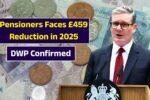Starting April 2025, the UK government will reinstate free TV licences for all residents aged 75 and over, a significant victory for pensioners. For many older adults, television is a vital source of news, entertainment, and companionship, particularly amid rising living costs. This policy reversal restores a universal benefit, alleviating financial pressures for millions of retirees.
What is a TV Licence?
A TV licence is required in the UK to watch live broadcasts or use BBC iPlayer, currently costing £169.50 per year. For pensioners on fixed incomes, this fee can be a burden, making the free TV licence scheme essential for ensuring access to media without financial strain.
History of Free TV Licences
Since 2000, free TV licences were provided to all UK residents aged 75 and over. In 2020, the responsibility for funding shifted to the BBC, which restricted eligibility to those receiving Pension Credit, impacting millions. Following advocacy from charities, MPs, and the public, the government has reinstated universal access for over-75s starting in 2025.
Key Details of the 2025 Policy
The reinstated free TV licence scheme includes:
- Universal Access: All UK residents aged 75 or older are eligible, regardless of income or benefits.
- Government-Funded: The government will bear the costs, sparing the BBC financial pressure.
- Start Date: The policy takes effect in April 2025, coinciding with the new financial year.
This initiative is expected to benefit approximately 4.3 million pensioners across the UK.
Why the Policy Changed
The decision to restore free TV licences was driven by:
- Cost-of-Living Pressures: Rising expenses have strained pensioners, necessitating financial relief.
- Combating Loneliness: Television offers companionship, supporting mental health for those living alone.
- Public Campaigns: Advocacy from groups like Age UK emphasized the policy’s value, garnering widespread support.
- Government Priorities: The policy reflects commitments to protect seniors during economic challenges.
Eligibility Criteria
The free TV licence applies to:
- All UK residents aged 75 or older.
- Pensioners in England, Scotland, Wales, and Northern Ireland.
- Those in private homes or care facilities.
Around 4.3 million individuals are projected to benefit.
How to Claim the Free TV Licence
The process is designed to be simple:
- Automatic Qualification: Current TV licences will automatically become free for those aged 75 or older.
- Notifications: TV Licensing will send confirmation letters to eligible pensioners.
- New Applicants: Those turning 75 in 2025 should contact TV Licensing to update their records.
- No Means-Testing: Eligibility is not tied to income or benefit status.
Pensioner Feedback
The policy has been warmly welcomed:
- “This takes a weight off my shoulders,” said Margaret, 79, from Manchester.
- “TV keeps me connected to the world. It’s great to see this support,” shared John, 82, from Glasgow.
The free licence eases financial stress and enhances quality of life for many.
Expert and Charity Views
Charities like Age UK praise the move as a step toward fairness, highlighting its role in reducing loneliness and promoting wellbeing. Economists, however, note the £700 million annual cost to the government, sparking debates about long-term funding. Advocates argue the social benefits outweigh the expense.
Impact on the BBC
With the government funding the scheme, the BBC avoids financial strain, potentially safeguarding its budget and preventing service cuts. This also mitigates criticism over rising licence fees.
Challenges and Criticisms
Despite broad support, concerns include:
- Funding Sustainability: Questions remain about how the government will manage the £700 million annual cost.
- Equity Concerns: Some argue wealthier pensioners should not receive the same benefit as those with lower incomes.
- Long-Term Viability: Future governments may reconsider the scheme’s continuation.
Financial Benefits for Pensioners
Eligible households will save £169.50 annually, based on the current TV licence fee. For couples where both are over 75, savings could total nearly £340 every two years, offering significant relief for those on fixed incomes.
Additional Pensioner Support in 2025
The free TV licence complements other 2025 benefits, such as:
- Triple Lock Pension Increases: Ensuring higher state pension payments.
- Winter Fuel Payments: Helping with heating costs.
- Free or Subsidized Travel: Including bus passes for local transport.
These measures aim to protect pensioners from rising costs.
Why Television Matters
For many seniors, television provides:
- Access to news and essential information.
- Entertainment and companionship.
- A tool to reduce loneliness and isolation.
- A connection to the wider world.
Research shows over 90% of those aged 75 and older watch TV daily, highlighting the policy’s importance.
Global Context
The UK’s scheme aligns with similar policies elsewhere:
- Ireland: Free TV licences for those over 70.
- Germany: Reduced fees for low-income pensioners.
- Scandinavian Countries: Public broadcasting funded through taxes, not individual fees.
This places the UK among nations prioritizing senior support.
Policy Timeline
- 2000: Free TV licences introduced for all over-75s.
- 2020: Eligibility limited to Pension Credit recipients.
- 2025: Universal free licences restored for those aged 75 and over.
This reflects evolving priorities for supporting the UK’s ageing population.
FAQs – Free TV Licences 2025
- Who qualifies for the free TV licence in 2025?
All UK residents aged 75 or older, regardless of income or benefits. - When does the scheme start?
April 2025, at the beginning of the financial year. - Do pensioners need to apply?
Most qualify automatically, but those turning 75 in 2025 should contact TV Licensing to update their details. - How much will pensioners save?
£169.50 per year per household, based on the current TV licence fee. - Will the BBC fund the scheme?
No, the government will cover the costs, relieving the BBC of financial responsibility.





